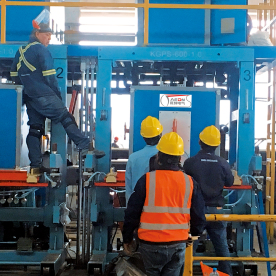[Precision-Crafted Spare Parts for Annealing Machines]Enhancing Operational Efficiency with Precision-Crafted Spare Parts for Annealing Machines: The Key to Manufacturing Success
News 2024-9-9
****
Enhancing Operational Efficiency with Precision-Crafted Spare Parts for Annealing Machines: The Key to Manufacturing Success
Importance of Precision in Spare Parts
One of the primary reasons for the reliance on precision-crafted spare parts is the demand for accuracy in the operation of annealing machines. These machines operate in high-temperature environments where even minor inaccuracies in components can lead to significant failures. Precision-crafted spare parts are engineered using advanced manufacturing techniques and materials to meet the specific tolerances required for each component. This attention to detail ensures that every piece works seamlessly with the machine’s overall design and functionality, reducing the risk of malfunction and downtime.
Extended Machine Lifespan
Annealing machines are a considerable investment for any manufacturing operation, and their longevity is critical to achieving a favorable return on that investment. Regular maintenance is essential, but the use of high-quality, precision-crafted spare parts can significantly extend the lifespan of these machines. By using parts that are manufactured to exact specifications, manufacturers can avoid the complications associated with ill-fitting or low-quality components, which can lead to accelerated wear and tear.
Cost Savings Through Preventive Maintenance
One of the best ways to manage costs in manufacturing is through preventive maintenance. By investing in precision-crafted spare parts, manufacturers not only ensure their machinery runs efficiently but also save money in the long run. Low-quality replacements might be cheaper upfront, but they can lead to more frequent breakdowns and repairs, causing costly production delays. Precision parts, engineered for durability and performance, can help avoid these issues, providing a more reliable and cost-effective solution over time.
Customization for Specific Applications

Enhancing Operational Efficiency with Precision-Crafted Spare Parts for Annealing Machines: The Key to Manufacturing Success
Optimizing Performance

Enhancing Operational Efficiency with Precision-Crafted Spare Parts for Annealing Machines: The Key to Manufacturing Success
Supply Chain Reliability
Another aspect worth considering is the reliability of supply chains for spare parts. In today’s fast-paced manufacturing environment, delays in obtaining spare parts can halt production lines, resulting in significant losses. Partnering with reputable suppliers who specialize in precision-crafted spare parts for annealing machines helps ensure that businesses have access to the components they need when they need them. It fosters a smoother operational flow, minimizes downtime, and allows for quick responses to unexpected maintenance needs.
Sustainability Considerations
Last but not least, there is an increasing focus on sustainability in manufacturing. Utilizing precision-crafted spare parts can contribute to more sustainable practices in several ways. Longer-lasting parts reduce waste and the frequency of replacements, leading to lesser environmental impact associated with manufacturing and shipping new components. Moreover, machines running efficiently tend to consume less energy, aligning manufacturing practices with broader sustainability goals.
Conclusion
In conclusion, precision-crafted spare parts for annealing machines are not just an optional upgrade; they are essential for maximizing efficiency, durability, and overall performance in manufacturing. They contribute to extended machine lifespans, cost savings, and customization, while also ensuring reliability in operations. As the manufacturing landscape continues to evolve, prioritizing quality in spare parts is a critical step toward achieving operational excellence and maintaining a competitive edge in the marketplace. Investing in these high-quality components is investing in the future profitability and sustainability of manufacturing operations.
